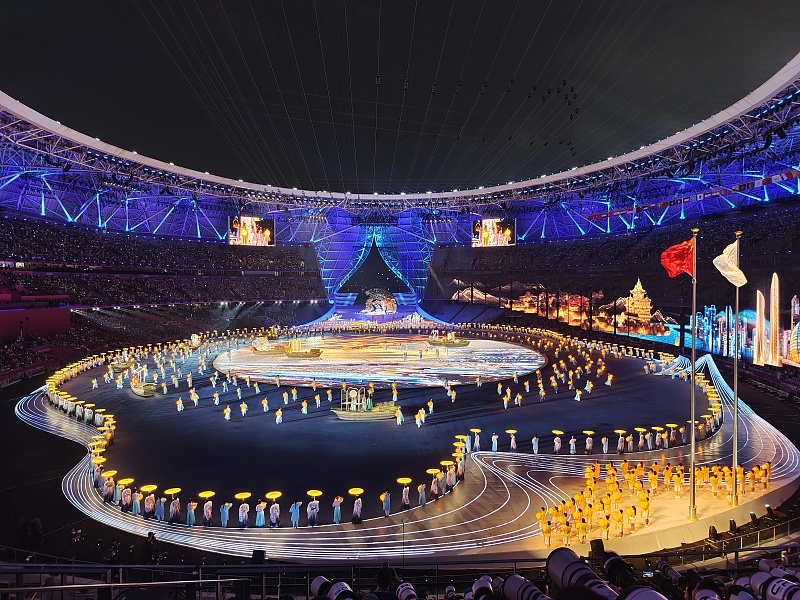The 19th Asian Game is underway in Hangzhou, the capital of east China’s Zhejiang Province, from September 23 to October 8. Chinese President Xi Jinping attended the opening ceremony and declared the Hangzhou Asian Games open on the night of September 23.
This marks China’s third time hosting the Asian Games, spanning a 33 year period starting from Beijing to Guangzhou and now Hangzhou. Once again, China has offered a platform for peace and friendship through the Asian Games, bringing together people from diverse regions and ethnic backgrounds.
The enrollment of all 45 member nations of the Olympic Council of Asia highlights the widespread participation, with countries and regions like South Korea, Mongolia, and Palestine sending their largest-ever delegations in the history of the Asian Games. A total of over 12,000 athletes set a new record for the number of participants in the Asian Games.
In addition to its immense scale, the Hangzhou Asian Games also stands out as the edition with the most number of events compared to previous Asian Games. It includes 40 major sports, 61 disciplines, and a staggering total of 481 events. Of the 40 major sports, 29 are Olympic sports that will follow the program set for the upcoming Paris Olympics, while the remaining 11 non-Olympic sports showcase a diverse array of distinctive sports from various regions in Asia. Furthermore, the Games will introduce emerging sports such as skateboarding, breakdancing, and e-sports for the first time.
The current edition of the Games are mainly hosted in the city of Hangzhou, with an additional five co-host cities: Ningbo, Wenzhou, Huzhou, Shaoxing, and Jinhua. The Games feature a total of 56 competition venues, 31 independent training facilities, one Asian Games Village, and five sub-villages, boasting the broadest regional coverage in the history of the Games.
On September 16, 2015, Hangzhou was honored with the right to organize the 19th Asian Games in 2022. As the capital city of Zhejiang Province, Hangzhou thrives within a cultural legacy that spans millennia, creating a truly magnificent and illustrious heritage. Throughout different epochs in Chinese history, Zhejiang has consistently assumed a pivotal role. Anchored in the principles of China’s reform and opening-up policy, Zhejiang has fostered its development with a global outlook, paving a steadfast and expansive path towards progress.
Since 2003, while experiencing remarkable economic growth, Hangzhou has remained unwavering in its commitment to safeguarding its precious cultural traditions and embracing the essence of universal values. Economically, Hangzhou’s GDP soared to nearly 1.9 trillion yuan in 2022, positioning it among the nation’s leading cities. In the meantime, Hangzhou has garnered well-deserved acclaim within the evaluation system assessing the happiness index of Chinese cities, which factors in social security, cultural heritage, and the level of civilization.
At a welcoming banquet ahead of the opening ceremony of the 19th Asian Games, President Xi called for promoting peace, solidarity and inclusiveness through sports. Over the past few decades, the overall stability of the Asian region has been maintained, with sustained rapid economic growth achieving an “Asian miracle.”
As a collective bound by geographical proximity and cultural affinity, the people of Asia possess a unique sense of destiny. It is imperative for us to harness the power of sports as a catalyst for peace, upholding the principles of amicable coexistence and pursuing mutually beneficial outcomes. By rejecting antiquated Cold War mentalities and divisive camp-based confrontations, Asia can assume a crucial role as an unwavering pillar of global peace and stability.
Furthermore, the Asian people should utilize sports as a vehicle to foster unity among nations, seizing historical opportunities and embracing collaborative strategies to surmount challenges. Practicing the motto of the Olympic Council of Asia (OCA) of “Ever Onward,” we can usher in a broader path of shared development and expanded openness across the Asian continent.
Moreover, sports serve as a powerful conduit for promoting inclusivity, nurturing cultural confidence, and facilitating the exchange of ideas and mutual learning. Through these endeavors, Asia can continue writing a new chapter of extraordinary achievement in its rich tapestry of civilization.
China has always attached great importance to the development of sports and actively engaged in international Olympic events, embodying the Olympic motto of “Faster, Higher, Stronger – Together.” Despite the challenges like the COVID-19 pandemic, China delivered an exceptional “Simple, Safe, and Splendid” Beijing Winter Olympics in 2022 and Beijing becomes the first city to host both the Summer and Winter Games.
With utmost confidence, the Chinese government strives to present a spectacular Asian Games that is “distinctly Chinese, uniquely Asian and spectacular,” thereby making new contributions to the progress of the Olympic movement and nurturing unity and friendship among the Asian people.
This article was first published on CGTN





